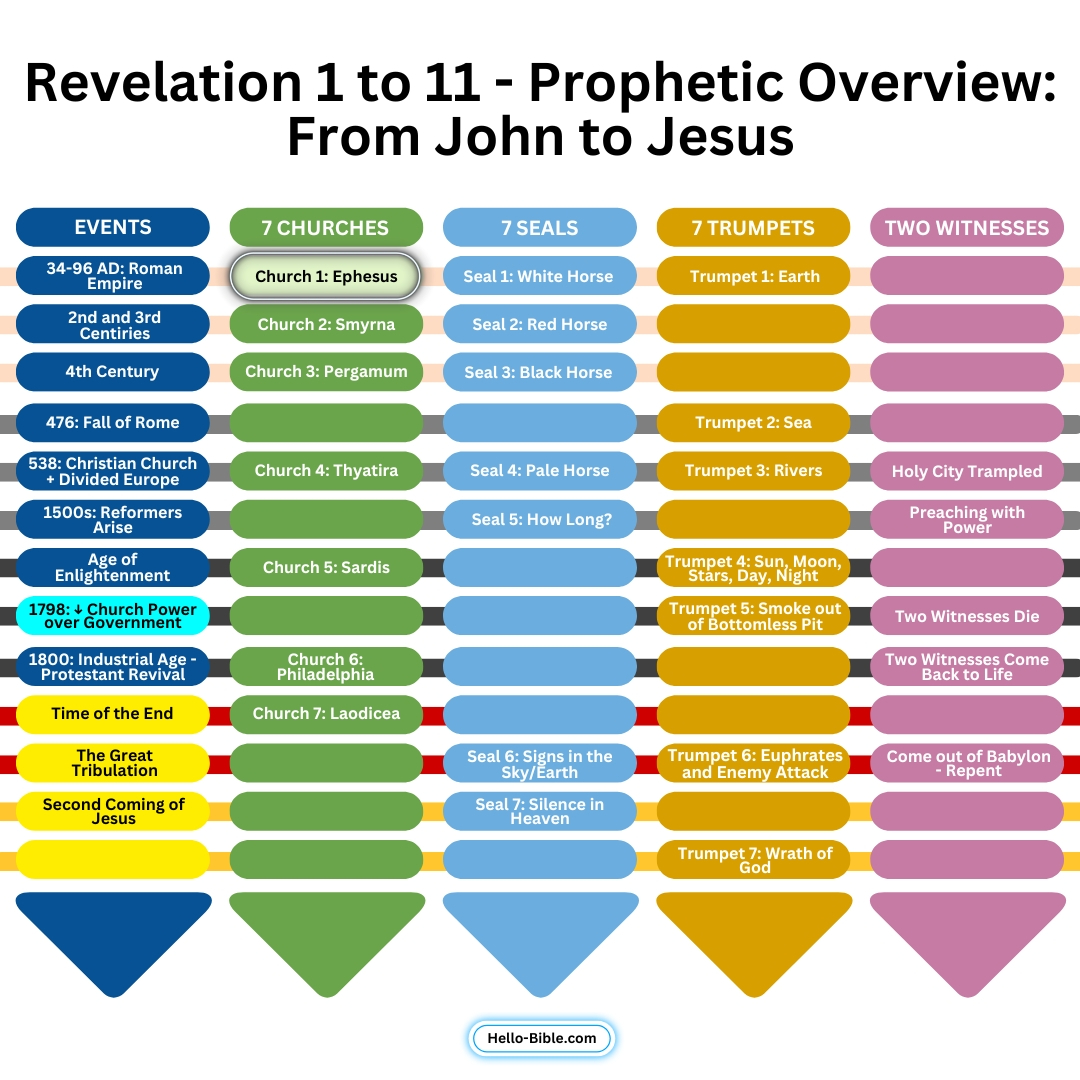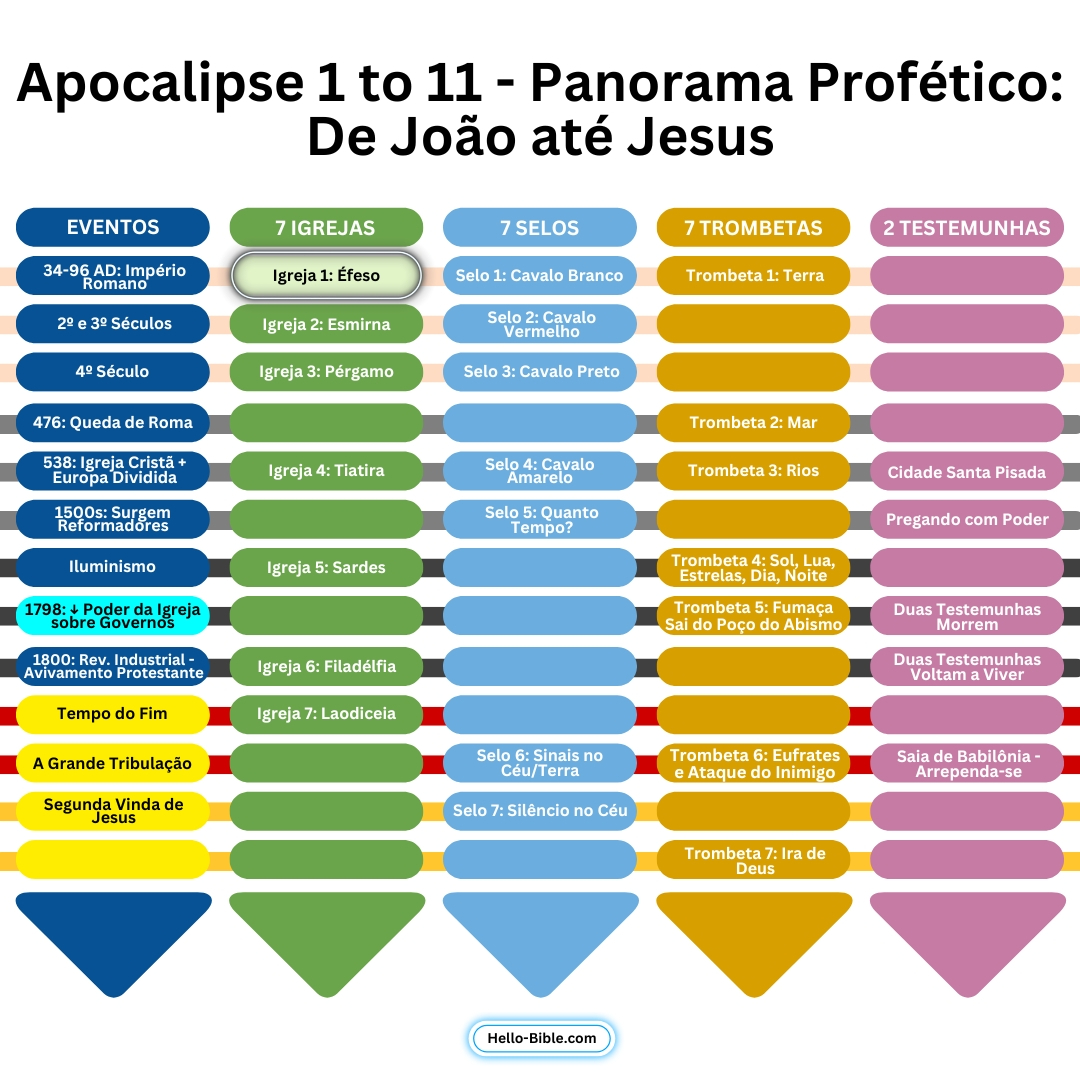1 Unto the angel of the church of Ephesus write; These things says he that holds the seven stars in his right hand, who walks in the midst of the seven golden lampstands;
2 I know your works, and your labor, and your patience, and how you can not bear them who are evil: and you have tried them who say they are apostles, and are not, and have found them liars:
3 And have endured, and have patience, and for my name's sake have labored, and have not fainted.
4 Nevertheless I have somewhat against you, because you have left your first love.
5 Remember therefore from where you are fallen, and repent, and do the first works; or else I will come unto you quickly, and will remove your lampstand out of its place, except you repent.
6 But this you have, that you hate the deeds of the Nicolaitans, which I also hate.
7 He that has an ear, let him hear what the Spirit says unto the churches; To him that overcomes will I give to eat of the tree of life, which is in the midst of the paradise of God.
Drawing Connections
The church in Ephesus faced challenges from true prophets, incomplete preachers, and false teachers, requiring members to discern and respond to various teachings. While they successfully identified and rejected false doctrines, such as sorcery, and gained a solid understanding of true doctrine, they struggled with maintaining love within the church. Despite their doctrinal soundness, they lacked the "undying love" that Paul had emphasized in his letters earlier (Ephesians 6:23-24). Jesus wants us to know that without love, even the most complete doctrine is insufficient.
In Part 1 of this study about the church in Ephesus, we looked at the historical and biblical views of the city, its culture and the local church. Today, we will take a closer look at the details of the letter itself and dive deep into the message directed at the church in Ephesus. We will also take a look at its prophetic application.
Part 1 Part 2
PART 2
Closer Look
*** Recipient -> "To the Angel of the Church of Ephesus" ***: As we studied in lessons #9 and #12, we know that the word ‘angel' refers to the messenger or leader of that church. A good part of the letter is addressed to the leader of the church. As we read the message, we can see what a great responsibility a leader has before God. The conditions described are directed at the leader, but they reflect the general state of the church.
*** Sender -> "he that holds the seven stars in his right hand, who walks in the middle of the seven golden candlesticks" ***: In Revelation 1:20, we read that the seven stars in His right hand are the seven angels, or leaders of the churches, and that the seven candlesticks are the seven churches. He is telling the leader of the church in Ephesus that He is in control of everything. He is among the church members, and He has never abandoned the church leaders. He literally knows them like the back of His hand.
*** Assessment -> "I know…" ***: Here Jesus is describing how well He knows the situation in the church. These are the things Jesus points out about the leader and the church:
- Works: the church of Ephesus is praised for their incessant 'hard work' or labor (from the Greek kopon), and patience. They are not yet tired from laboring for Jesus’ sake. They have endured evil people coming along threatening the truth they stood for.
- True doctrine: they tested the apostles that arrived at their church or that came from within the members, and were able to identify the ones who were not telling the truth. The church was able to stay faithful to the original instructions of the Gospel, and rejected the false teachings of the Nicolaitans.
- Problem: losing their first love. The problem with checking everyone who comes along, but without love, is that we run the risk of becoming legalistic and overly critical. Separating the liars from the truth-tellers was and still is extremely important. But it looks like the emphasis in Ephesus was on the “trying” the so-called apostles. Yes, they were right in finding out if those people were telling the truth or not. But all the good works a church may do are worthless if there is no love (1 Corinthians 13). Only love can maintain the balance between church responsibility and interpersonal relationships.
*** Appeal -> "Remember, repent, and do, or else" ***: The first step was to keep remembering, or to keep in mind the place from where they had fallen. They had lost focus on what is central to the church: love. The second step was to repent. Repenting requires an action. It gives the idea that someone is walking in the opposite direction, and needs to make a 180-degree turn. They had forgotten who God is, because God is love (1 John 4:8). The church of Ephesus was walking away from God. Jesus is here calling them back to God. After doing the first two steps, the third step should then come naturally. If you have in mind that the God you serve is love, you will want to walk towards Him, and so you will automatically want to do the things which are pleasing to Him. Just as you did it in the beginning. That is why the Bible tells us that we can recognize people by their fruits/works (Matthew 7:16). Works with meaning (love) indicate in which direction of the path you are going. Now, Jesus does warn the leader that if the church does not repent, judgment will fall upon them, and they will lose the privilege of being light bearers. Jesus will remove their lampstand from its place if they do not repent. Ancient Israel lost their first love (Jeremiah 2:2), and their condition after that was very serious (Jeremiah 2). When Israel rejected Christ, God removed their lampstand from its place (Jeremiah 32:30-31), and gave it to the spiritual descendants of Abraham, through Jesus’ new covenant signed with His blood on the cross (Hebrews 8). All who believe in Jesus and His sacrifice are called to be light bearers of His truth. When we consciously refuse to bear His light, as He instructed us to, we become responsible for our own sentence, and therefore, with our actions, we are choosing to have our lampstand removed from His presence.
*** Call to hear the Spirit -> The Spirit says to the churches ***: The Spirit is saying this message about loss of love loud and clear to all in the churches (plural - remember that all churches got the entire book of Revelation, including the messages to the other churches). There are no excuses for not listening. If someone didn’t hear the message, it is because they chose to show their backs to God, and not their faces (Jeremiah 32:33). This call back, although very serious, is a call coming from Jesus’ love for the sinner. This is not a call of hopelessness. If the situation was hopeless for all the members in the church, there would not be a need for a promise made to those who overcome it. Since we do have a promise, we can still decide to turn back to God and follow His love.
*** Promise -> To the one who overcomes ***: Jesus is the way, the truth and the life (1 John 4:16). By turning away from God (Love), the church in Ephesus was starting a journey down a very dangerous path that inevitably leads to falseness and death. The further we move away from God, the closer we move towards Self. And Self leads to destruction. Not surprisingly, the promise to the one who turns away from this path of eternal death is a promise about eternal life. The tree of life was first mentioned in the Garden of Eden (Genesis 2:9), and it was located in the middle of the garden. To eat from the tree of life meant that the ones who ate from it would live forever (Genesis 3:22). Because of Christ’s death, we are able to remain in the path towards eternal life. When people choose His path, they will be able to enjoy the benefits of the tree of life, which is in Heaven.
*** Church history view and prophetic application ***: The message to the churches were messages directed to those churches in John's time, to the first century Christians. It was a message that made sense to them, addressing real situations they were going through. At the same time, we cannot ignore what Jesus said to John when He told him to write this letter. The message to the churches was also about the churches that were to come (Revelation 1:19). And so, we have to look at this message under prophetic lenses as well, covering the time from where John was writing all the way to the Second Coming.
As verse 2 of Revelation 2 indicates, the message is pointing to a time when those who are faithful will overcome. A time where they are promised eternal life. Since no human will get to be alive all this time, from the time of John to when Jesus returns, we can conclude that we need to also see this message as a prophetic one . This message covers the spiritual state of the church throughout the centuries. When we look at the Church History, we can see that it went through different phases. Since Ephesus is the first church in the list, it makes sense that this was a reflection of the general church behavior closest to John's time. In practical terms, at any point in time, local churches and individuals can go through different spiritual states, matching the description of any of these churches. But looking at the trends of the time, we can see where each of these churches has a corresponding moment in history.
After Jesus resurrected and ascended, the world church experienced an exponential growth. Prophetically, corresponding to the church in Ephesus, around the last decade of the first century, by the time John wrote the book of Revelation, we see that things were starting to change. The world church started to experience the loss of the feeling that first sparked the church growth. And so, they started to depart from the freshness and clarity of the original teachings of Jesus: "[…] Love the Lord your God with all your heart and with all your soul and with all your mind. […] and […] love your neighbor as yourself". (Matthew 22:37-39).

© Hello-Bible - 2024

© Hello-Bible - 2024
Overview
The church in Ephesus was a good church, with many good qualities. But it was starting to go down a very dangerous and deadly road, the road of lovelessness. When we move away from the purity and simplicity of the Gospel and start on the path that points to ourselves, we place our life in jeopardy. When we move away from love, whether individually, or as a church, and regardless of the time in history we are in, what we are actually doing is rejecting the call to hear the Spirit. When we remove love from the church equation, we are left with empty laws and rituals, and meaningless talk. True Christian religion cannot exist without love. When love is out, self is in, and the church becomes just a building and stops being the body of Christ. Jesus is extending His right hand to us today, just as He extended His right hand to the church in Ephesus. He wants to show us that He still has a place for us among His stars and His lampstands. Through His death we become overcomers, and can receive His promise of eternal life.
